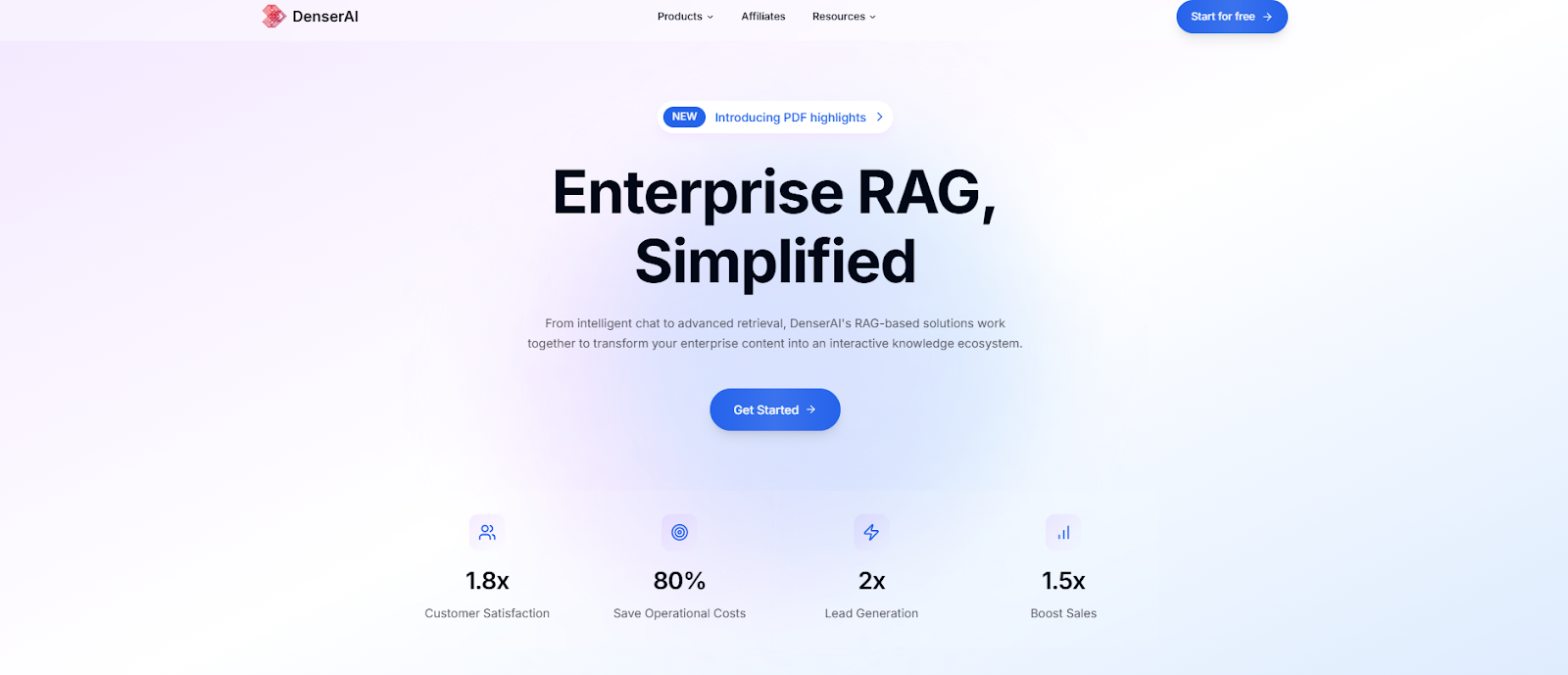
7 Best Elasticsearch Alternatives For Smarter Search (2026 Comparison)

Due to its powerful search and analytics capabilities, Elasticsearch has become a popular choice for many businesses. Many use it for tasks like e-commerce searches, business intelligence, and IT monitoring.
Looking for an Elasticsearch alternative? The best alternatives for 2026 include Denser.ai (AI-powered semantic search), Apache Solr (open-source full-text search), Algolia (hosted instant search), Typesense (developer-friendly), and Azure Cognitive Search (Microsoft ecosystem integration).
However, it may not be the perfect fit for every business. It requires a lot of computing resources to run smoothly, which can make it expensive. Setting it up and managing it can also be complex, especially for teams without technical expertise.
Quick Comparison: Top Elasticsearch Alternatives
| Alternative | Best For | Pricing Model | Key Strength |
|---|---|---|---|
| Denser.ai | AI-powered enterprise search | Tiered plans, free tier | Semantic AI + real-time updates |
| Apache Solr | Self-hosted full-text search | Free (open-source) | Mature, customizable |
| Algolia | E-commerce instant search | Pay per search request | Speed + developer experience |
| Azure Cognitive Search | Microsoft/Azure users | Scale unit-based | Deep Azure integration |
| Typesense | Small-medium projects | Memory-based pricing | Simple setup, low latency |
| Manticore Search | SQL-familiar teams | Free (open-source) | High performance, SQL queries |
| Vespa | Large-scale ML applications | Resource-based | Vector + lexical hybrid search |
As your data grows, Elasticsearch can become harder to scale and maintain without additional costs and effort. These challenges often lead businesses to search for alternatives that are simpler, cheaper, or more advanced.
In this article, we'll explore alternatives to Elasticsearch to help you find powerful search engines that are more cost-effective and better at scaling your business as it expands. Whether you need a chatbot on your website or advanced document search capabilities, these tools offer modern solutions. For a deeper look at how AI-native search engines use machine learning for smarter results, see our comparison guide.
Why Look for Elasticsearch Alternatives?#
Elasticsearch is an open-source search and analytics engine built on the Apache Lucene library. It's used for indexing and querying structured and unstructured data in real time. Developers often use it for full-text search, log analytics, and business intelligence.
Elasticsearch became a favorite for its performance and versatility, from powering search on e-commerce websites to enabling detailed log analysis for IT operations.
However, it's not always the best fit for every business. Exploring alternatives can help you find more suitable, cost-effective, and easier-to-manage solutions.
There are several reasons why you might consider alternatives to Elasticsearch. Let's break them down:
High Resource Consumption#
Elasticsearch comes with infrastructure demands and requires computational resources for indexing, querying, and maintaining operations. This can lead to higher operating costs and technical overhead.
If your infrastructure isn't equipped to handle these demands, you may experience slow performance or even downtime. It will often necessitate additional investments in hardware and management resources that push up costs.
Complexity#
Setting up and maintaining Elasticsearch can be complex. It requires a considerable level of expertise, which means investing in training for your team or hiring skilled professionals.
The complexity of managing Elasticsearch can lead to longer setup times and increased potential for errors. For businesses without a dedicated IT team, this complexity can be an issue.
Once deployed, Elasticsearch requires ongoing maintenance to ensure its optimal performance. Cluster management is challenging, involving tasks such as monitoring node health, balancing data across shards, and addressing node failures.
Platforms that support multiple programming languages simplify the integration process and allow teams with varied skill sets to implement the system faster.
Scalability Concerns#
When your data or traffic grows, Elasticsearch requires adding more "nodes" to handle the load. Nodes each take on a part of the task.
Elasticsearch also uses a lot of memory and computing power as it grows. This means higher costs for hosting, whether you're running it on your own servers or in the cloud. For smaller companies or those with limited budgets, these costs can add up quickly.
Specific Requirements#
Not all businesses need the same search features. Some may prioritize advanced search features for customer-facing applications. While others need real-time data indexing or better integration with cloud ecosystems like AWS or Azure.
Alternatives can offer specialized features tailored to industry requirements, such as semantic AI for a better understanding of user intent or simplified integration options for faster deployment.
Performance and Cost Considerations#
Elasticsearch generally offers robust performance, but not without limitations. For high-throughput or real-time applications, you might experience bottlenecks.
Alternatives could provide better performance under specific conditions, which means quicker response times or more efficient resource usage.
Additionally, managing Elasticsearch can become costly, especially when factoring in high-performance hardware and skilled personnel. Exploring alternatives might present more cost-effective solutions, either through lower infrastructure requirements or easier management.
Integration#
Depending on your current tech stack, certain alternatives might offer better integration capabilities.
If you're heavily invested in a particular ecosystem (like AWS or Azure), choosing an alternative that seamlessly fits into your existing environment can speed up your operations.
Inability to Handle Complex Query#
Elasticsearch is highly effective for keyword-based searches but struggles with complex queries that require semantic understanding. Its reliance on exact term matching and lack of contextual comprehension makes it unsuitable for modern applications like natural language queries or personalized recommendations. For a detailed comparison of these approaches, see our guide on semantic search vs keyword search. While it supports synonym dictionaries, maintaining them is labor-intensive, and integrating external machine learning models for semantic search adds significant complexity and cost. Additionally, Elasticsearch is not optimized for the computational demands of embedding-based searches, making it challenging to scale semantic search for large datasets.
Grow your business without growing your costs. Sign up for a free trial today and see how Denser.ai scales with you!
Top 7 Elasticsearch Alternatives#
When searching for an Elasticsearch alternative, it’s best to identify the features that best meet your business needs. Different tools are great in different areas, so understanding your priorities will help you make an informed decision.
Below, we’ll explore the top 7 alternatives in the search engine landscape, highlighting their features, benefits, and limitations.
1. Denser.ai#
Denser.ai is a modern search solution designed to address real-world business challenges. It goes beyond simple search functionality by using advanced AI to deliver accurate, relevant, and up-to-date results.

With features that improve customer engagement and search performance, Denser.ai stands out as a top choice for businesses of all sizes.
Dynamic Search with Real-Time Updates#
Denser.ai uses a method called Retrieval-Augmented Generation (RAG) to search and index web pages continuously to keep your data up-to-date. Instead of relying on static data like some systems, Denser.ai actively updates its content.
This feature is useful for businesses that work with changing information, such as online retailers or customer support platforms. Real-time updates mean users always receive the most accurate and relevant search results.
Clean and Organized Data#
One of Denser.ai’s strengths is how it handles your data. The system automatically cleans up your information by:
- Removing unnecessary content: It filters out data that doesn’t add value to your searches
- Correcting errors: Fixes mistakes in your data to ensure accuracy
- Eliminating duplicates: Prevents the same information from appearing multiple times
Clean data is essential for businesses that rely on accurate responses. It helps the AI deliver better results, which reduces confusion for users and improves overall efficiency.
Continuous Learning#
Denser.ai learns and adapts as it’s used. Every interaction helps the system improve. Therefore, the more you use it, the smarter it becomes.
If customers repeatedly ask similar questions, Denser.ai notices patterns and adjusts its responses to provide better answers. The learning process ensures the system stays relevant and accurate over time, even as your business evolves.
Simple Integration for All Systems#
Integrating Denser.ai with your existing tools is simple, as it supports various methods to make setup easy, such as:
- Chat widgets: Add search functionality to your website without coding
- REST APIs: Seamlessly connect Denser.ai to your existing software
- Embedded iframes: Add Denser.ai to your website or app without major changes
These options make Denser.ai accessible to businesses of all sizes. Whether you’re running a small business or a large enterprise, you can easily scale up as your needs grow.
Semantic AI for Better Understanding#
Denser.ai uses semantic AI, which understands the meaning behind questions instead of just matching keywords. Customers get accurate answers, even for complex queries.
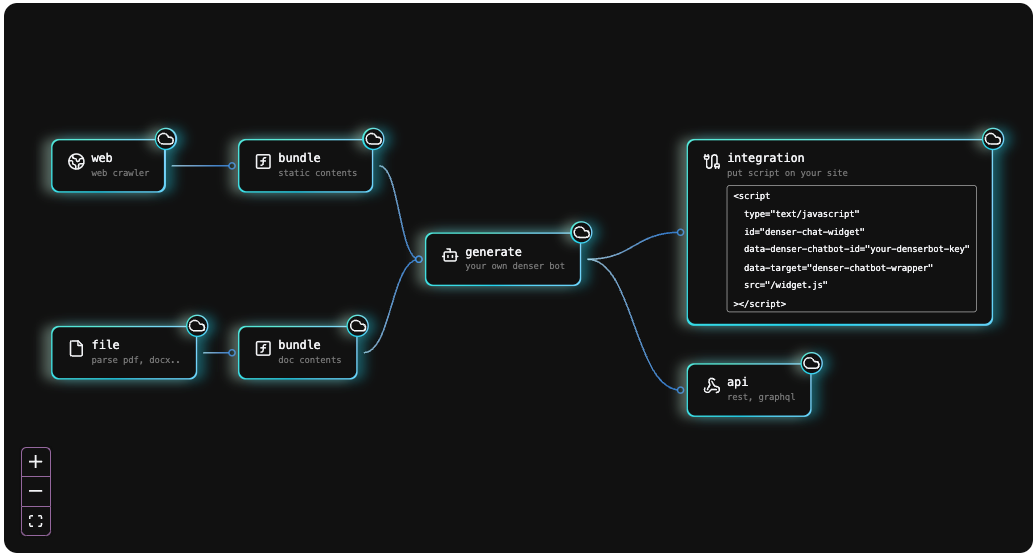
If someone searches for “affordable red shoes for hiking,” Denser.ai can understand the context and return results that fit all parts of the query, not just a single keyword. Delivering precise results improves customer satisfaction and engagement.
Features That Support Collaboration#
Aside from external use, Denser also helps teams work better internally. The File Chat feature makes it easy for team members to find information within company documents. Employees can quickly locate and share files, which improves communication and saves time.
Simplify search and reduce inefficiencies. Sign up for a free trial or schedule a demo today and deliver precise results to your customers!
2. Apache Solr#
Apache Solr is an open-source search server platform built on Apache Lucene. It is widely used for enterprise search and has been a reliable solution for many businesses for over a decade.
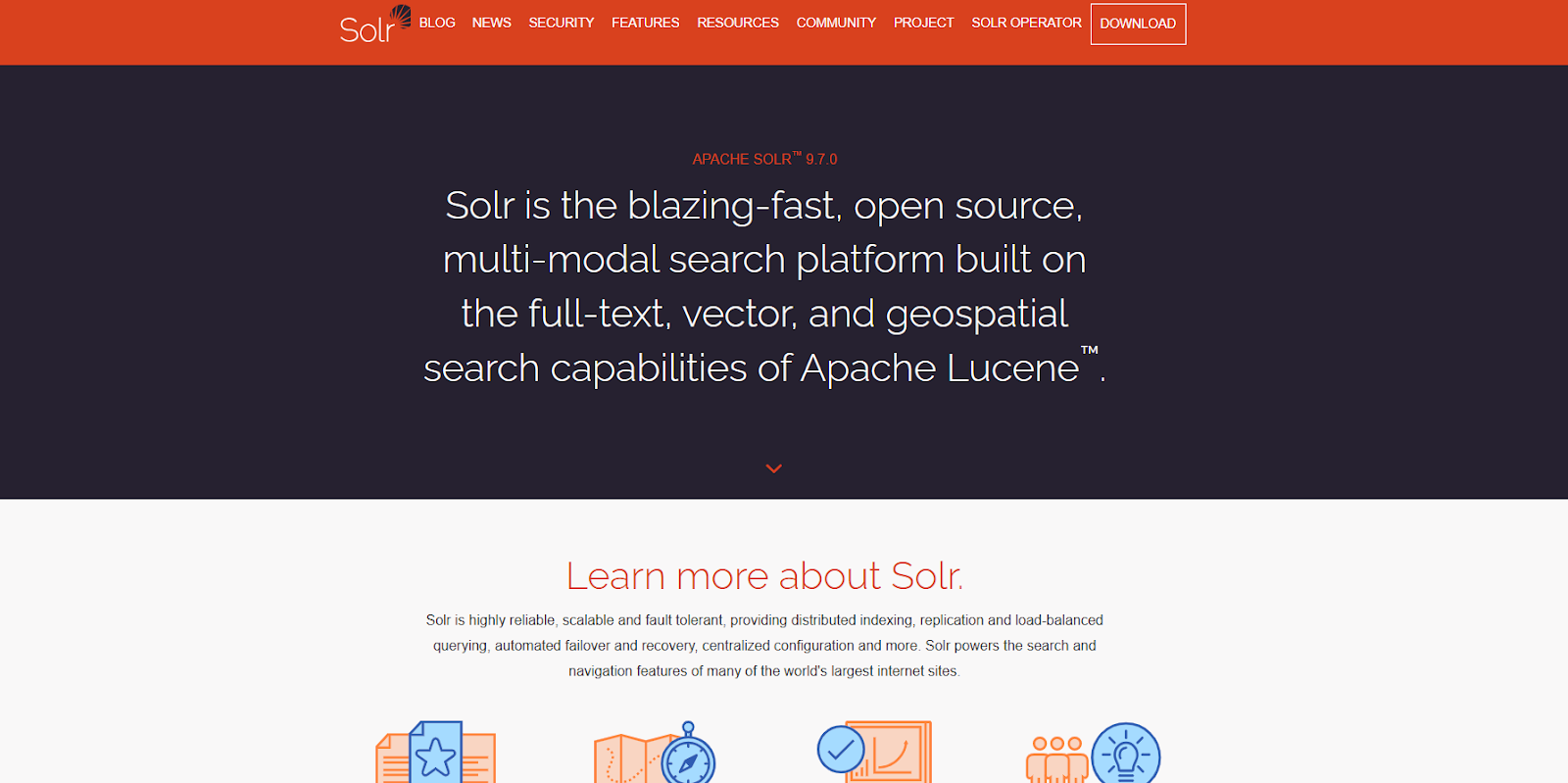
Image Source: solr.apache.org
However, this open-ended approach often requires development resources, which makes it less accessible for businesses seeking ready-to-use solutions. Denser.ai provides pre-built tools and integrations to help reduce deployment time and complexity.
Pricing#
Solr is open-source and free to use. However, costs may arise from hosting, maintenance, and scaling your infrastructure.
Key Features#
- Hybrid search for both structured and unstructured data
- Full-text search capabilities
- Faceted search and filtering
- Distributed indexing and replication
- Powerful search analytics and real-time indexing
- Extensive plugins and integrations
Limitations#
- Can be complex to scale and manage
- Performance might not match Elasticsearch for certain workloads
3. Algolia#
Algolia is a hosted search service designed to provide instant search capabilities for websites and applications. Known for its speed and ease of use, Algolia focuses on delivering a seamless user experience with minimal setup requirements.
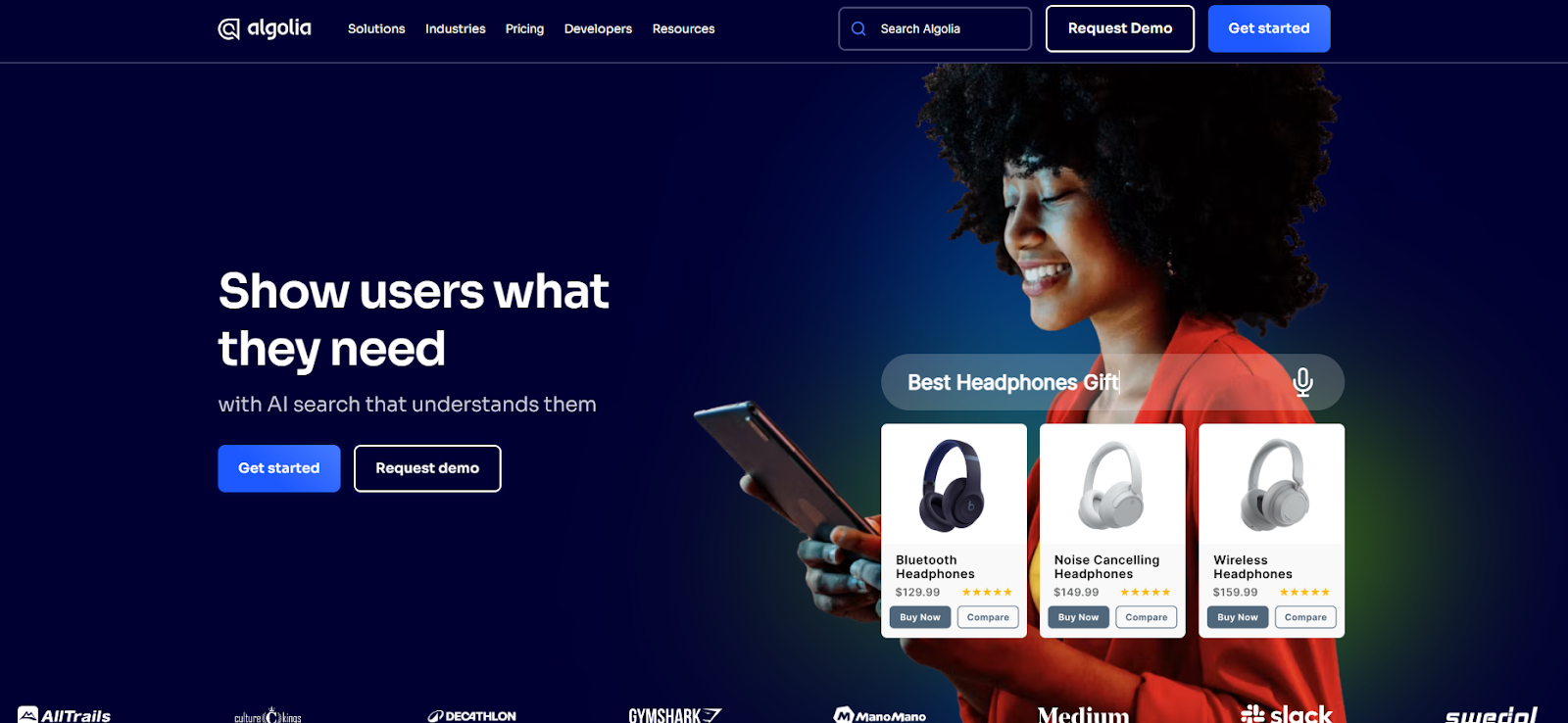
Image Source: algolia.com
It also offers AI-powered features like dynamic personalization to adapt search results based on user behavior. However, these features are primarily tailored for e-commerce and may lack the versatility needed for broader business applications.
Denser.ai provides a more holistic approach to AI that supports diverse use cases such as internal knowledge management, real-time data updates, and context-aware responses.
Pricing#
Algolia offers a Build plan for free and a Grow plan at $0.50 per additional 1k search requests. For more advanced needs, the Premium and Elevate plans require contacting Algolia for pricing.
Key Features#
- AI-driven adaptive learning for relevant search queries
- Connects buyers to relevant products in B2B and B2C
- Enables search across various data types
- Identifies optimal search strategies for high-performance
Limitations#
- Certain search results may be misleading or less accurate
- Requires significant upfront work for implementation
4. Azure Cognitive Search#
Azure Cognitive Search is a managed search-as-a-service solution provided by Microsoft Azure. It combines powerful search capabilities with AI-driven insights to deliver advanced search experiences.
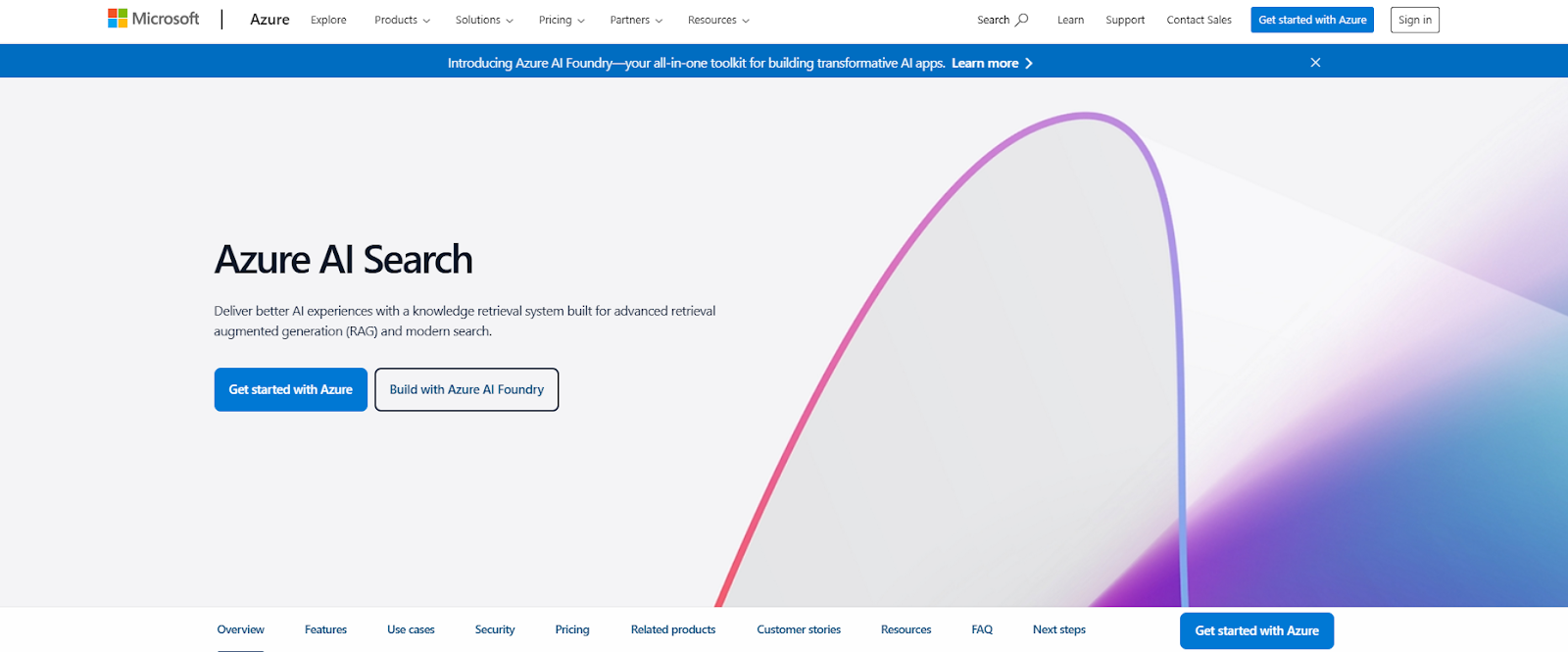
Image Source: azure.microsoft.com
The platform uses Azure’s cloud infrastructure for scalability, which makes it suitable for handling large-scale data. Still, this comes with substantial costs, especially for businesses that aren’t fully committed to Azure.
Denser.ai provides similar scalability but with a more efficient use of resources to keep operational costs manageable.
Pricing#
The pricing is based on Scale Units (SUs), which determine the capacity and performance of the service. Each tier comes with different limits for storage, the number of indexes, and scaling capabilities.
- Free tier: Designed for testing and experimentation with limited storage and functionality
- Basic tier: Ideal for small-scale applications with moderate storage and minimal scale-out capabilities
- Standard tiers (S1, S2, S3): These tiers provide increasing levels of storage and scale, suitable for mid-sized and enterprise applications requiring higher performance and more extensive indexes
- Storage optimized tiers (L1, L2): Built for applications with large datasets, such as archival searches or extensive document management systems
Key Features#
- AI-powered search capabilities
- Real-time indexing and search
- Comprehensive security and compliance features
- Integration with other Azure services
- Multi-language support
Limitations#
- Requires better cross-platform compatibility
- More flexible pricing options are needed
5. Typesense#
Typesense is an open-source search engine designed for simplicity and speed. It offers intuitive APIs that simplify integration for developers. However, this ease of use is limited to basic search functionalities.
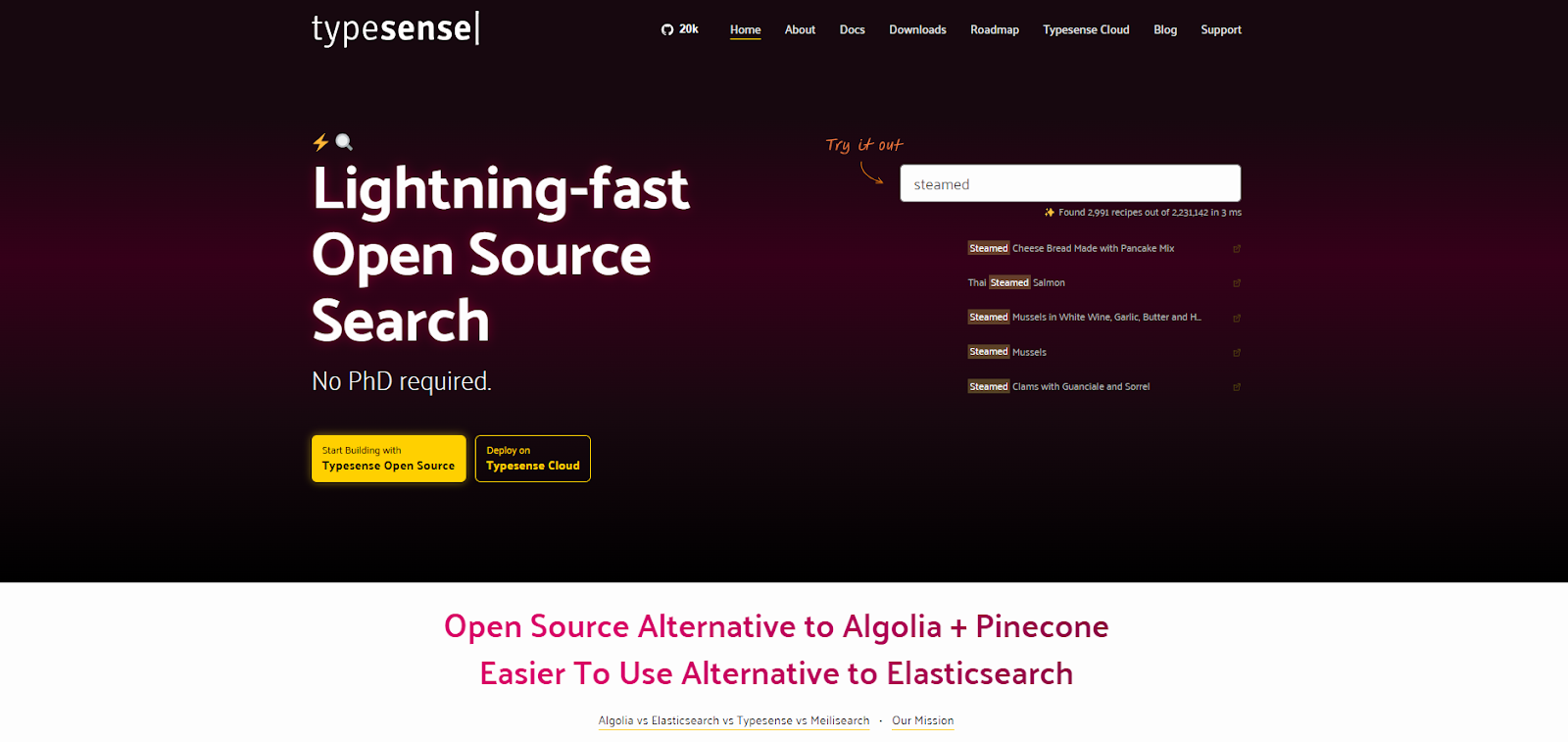
Image Source: typesense.org
When compared to Denser.ai, Typesense falls short in providing advanced features or real-time data updates powered by RAG.
Typesense also focuses on being developer-friendly, but it lacks pre-built integrations and advanced tools for non-technical users. Denser.ai offers easy deployment options like widgets and APIs for teams without technical expertise.
Pricing#
Typesense pricing is based on memory usage, starting at $0.03 per hour, which equates to $21.60 per month. Additionally, there is a charge of $0.14 per GB for data exceeding 0.5 MB.
Key Features#
- Built-in typo tolerance
- Filters results based on custom fields through dynamic sorting
- Search and sort within a specific area with Geo-Search
- Allows you to highlight and merchandise specific search results
Limitations#
- Less mature ecosystem compared to Elasticsearch
- Limited advanced features and scalability for large deployments
6. Manticore Search#
Manticore Search is an open-source search engine designed for high performance and advanced search capabilities. This is beneficial for developers who prefer more control over their search engine setup.
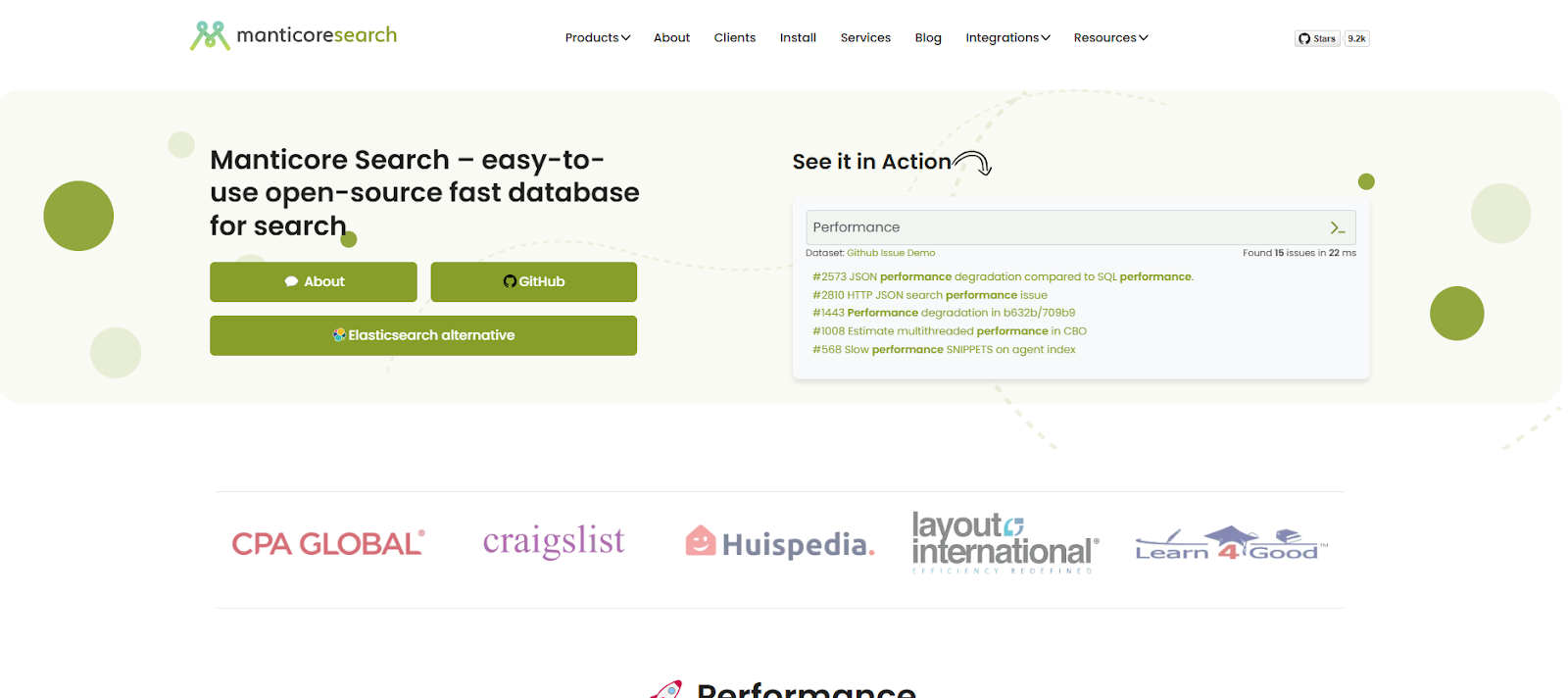
Image Source: manticoresearch.com
Manticore Search supports SQL-like queries that make it easier for developers familiar with SQL databases to interact with the system.
While this is convenient for some, it can feel limiting when compared to Denser.ai’s conversational AI, which understands user intent far beyond basic query syntax.
Pricing#
Manticore Search is free and open-source.
Key Features#
- Up to 15x faster on small data, 4x on large data, and 29x for log analytics
- Over 20 full-text operators and ranking factors
- Real-time indexing and search
- Supports MySQL, Postgres, MSSQL, ODBC, XML, CSV, and TSV
Cons#
- Occasional reports of index crashes
7. Vespa#
Vespa, developed by Yahoo, is an open-source search engine and vector database that integrates lexical search, vector search, and structured data search into a unified AI-powered platform.
It's designed to handle large datasets and offers flexibility for developers looking to build scalable systems.
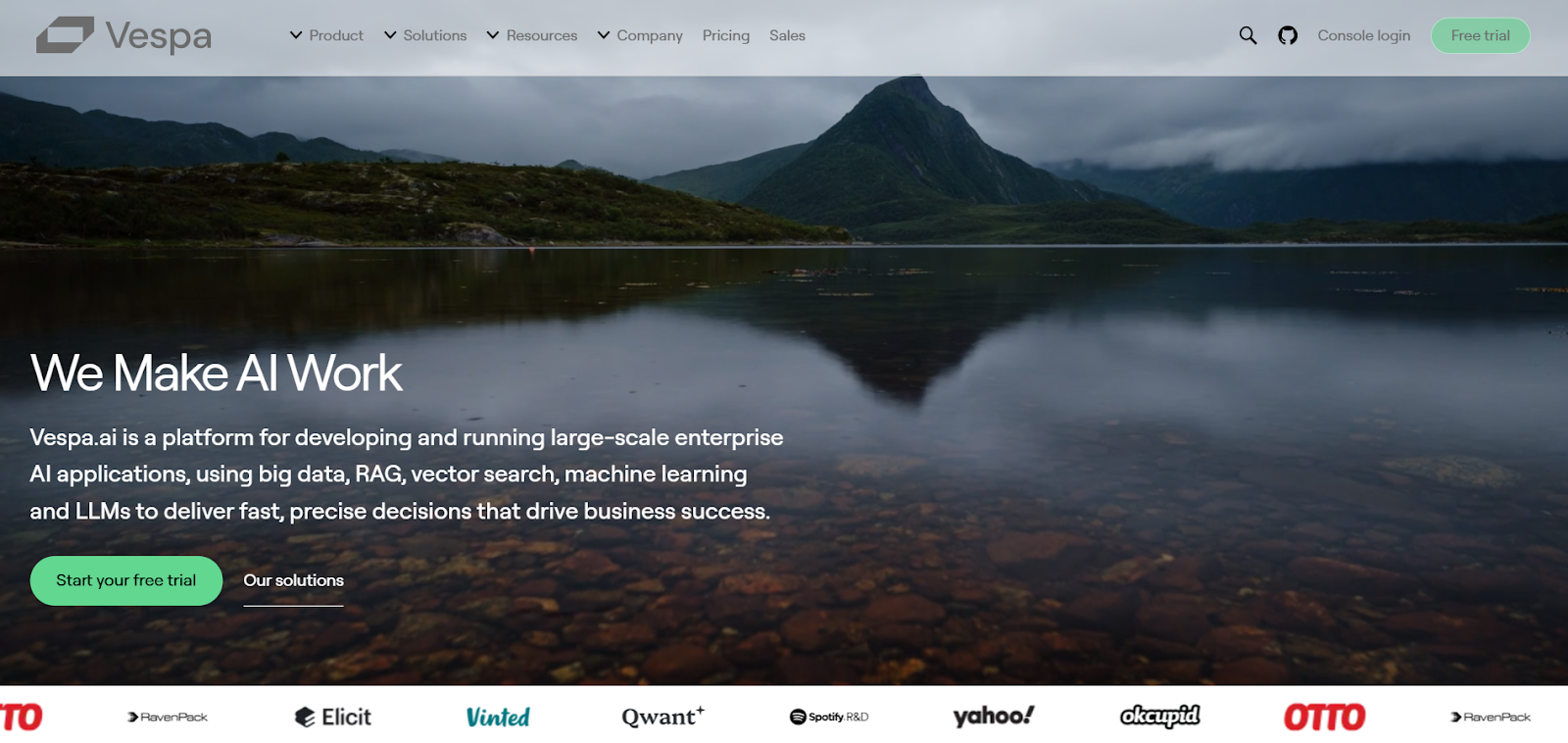
Image Source: vespa.ai
Vespa includes features for deploying machine learning models within its platform. While this allows for personalization and ranking, the implementation process is complex and resource-intensive.
Denser.ai, on the other hand, integrates advanced AI and machine learning features out-of-the-box that remove the need for extensive manual configurations.
Pricing#
Vespa charges based on the machine resources you use for your application, with costs calculated hourly. There are three pricing plans tailored to different needs: Basic, Commercial, and Enterprise.
- Basic plan: Pay only for the resources you use per hour, suitable for testing, small projects, or non-critical apps
- Commercial plan: Resource-based hourly billing with 24/7 support, ideal for customer-facing applications
- Enterprise plan: Hourly billing based on usage with 24/7 deployment support, great for big companies with high-demand apps and optimization
Key Features#
- Scalability for large datasets
- Tailors search results to individual users or specific situations
- Advanced search and machine learning capabilities
- Vespa's grouping language to organize and aggregate query matches
Limitations#
- More complex setup and maintenance
How to Choose the Right Elasticsearch Alternative#
The right Elasticsearch alternative depends on your specific needs and requirements. Here are some key factors to consider when making your decision:
Performance and Scalability#
You should assess the amount of data your application handles. Some alternatives perform better with large datasets, while others excel with smaller volumes. You may consider the speed at which you need accurate search results.
Fast query response times are essential for user satisfaction, especially in real-time applications. The solution you choose should scale with your growing data and user base without performance degradation.
If you’re managing moderate data and require simplicity, Typesense is cost-effective and easy to implement. For more advanced AI features, Denser.ai offers scalable solutions with minimal complexity.
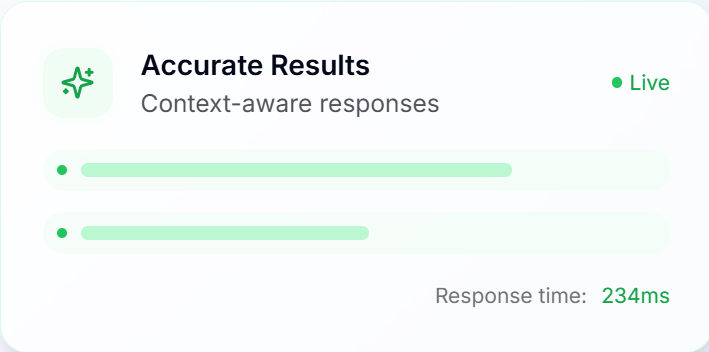
Algolia is good for speed but can become expensive. Denser.ai provides fast, context-aware search with broader use case support and lower long-term costs.
Ease of Use and Setup#
Evaluate the complexity of the setup process. Some solutions offer easy installation and configuration, while others may require extensive technical knowledge.
You must consider the ongoing maintenance requirements. Managed services can reduce the burden on your team but may come with higher costs. A user-friendly interface can significantly improve productivity, especially for non-technical users.
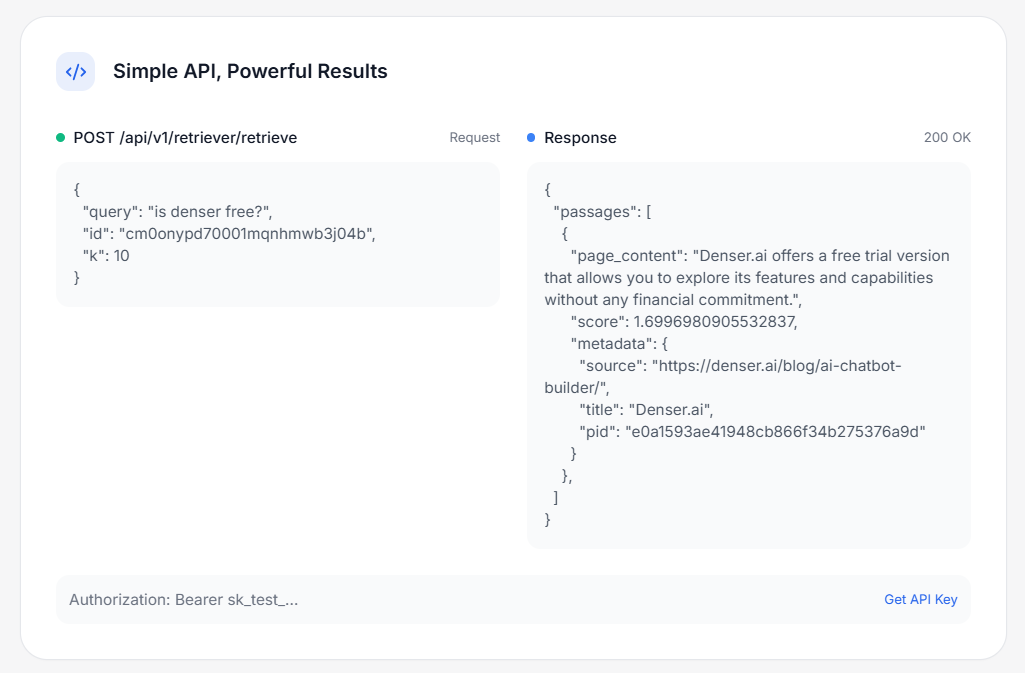
Denser.ai simplifies search deployment with features like pre-configured widgets and APIs. These tools reduce the need for advanced technical skills, where even small teams can implement powerful search capabilities faster.
Cost#
Determine the initial setup costs, including licensing fees and infrastructure investments. You should also consider ongoing costs such as hosting, maintenance, and potential scaling expenses.
Then, compare the total cost of ownership with the value provided by the solution's features and performance.
If you need a scalable and cost-effective solution, Denser.ai provides advanced features without the high costs associated with platforms like Algolia or Azure.
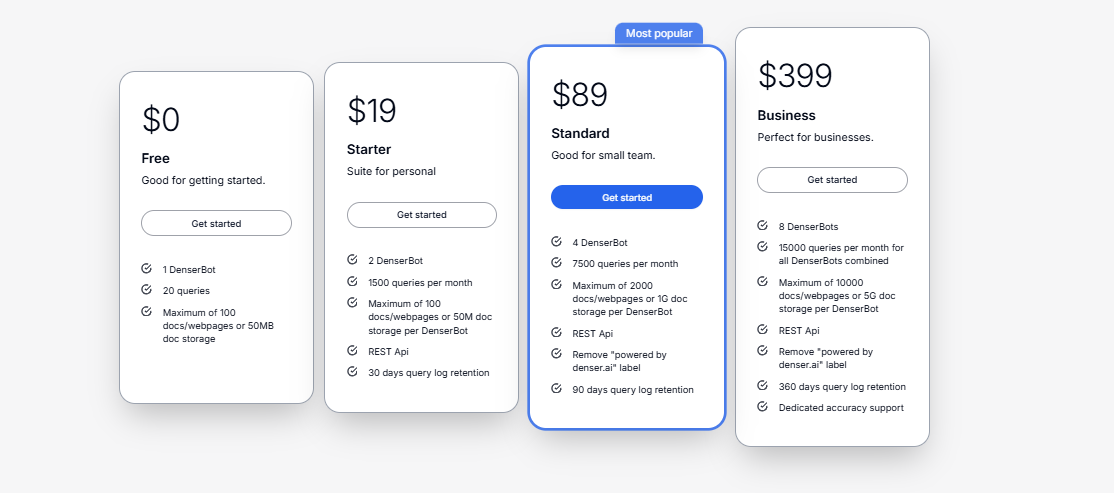
It offers advanced AI-driven search and scalability with a transparent pricing structure. Its tiered pricing helps you plan budgets without worrying about unexpected spikes due to high query volumes or increased data storage.
Integration and Compatibility#
A search platform that integrates easily with your existing tools reduces disruptions and maintains smoother data flow. The platform should also handle your data formats, such as structured (SQL, JSON) or unstructured (logs, documents).
You must check for robust APIs and SDKs that facilitate easy integration and customization. Also, look for support for third-party tools and services that you already use or plan to use in the future.
While pre-built integrations are great for quick deployment, customizable options are essential for unique business needs. Denser.ai balances ease of use with flexibility with its customization options and doesn't require deep technical expertise.
Features and Capabilities#
Think of which search feature you need–full-text search, faceted search, filtering, and ranking algorithms.
Consider if advanced AI and machine learning capabilities, such as semantic search or personalized recommendations, are essential for your use case. You may evaluate the data management features, including indexing, data storage, and real-time updates.
Most platforms support basic keyword searches, but advanced tools like Denser.ai deliver accurate results by understanding user intent through advanced AI capabilities.
Break Free from Traditional Search Limits, Switch to Denser.ai!#
Finding the right search solution can be challenging, especially when your current platform feels outdated or overly complex. While Elasticsearch has been a popular choice for years, it often comes with high resource demands, steep learning curves, and costly scalability.
If you're seeking a modern alternative that addresses these challenges, Denser.ai offers a smarter, more efficient way to power your search capabilities.
Denser.ai combines advanced AI with real-time indexing and full-scale integration to deliver precise and relevant search results.
If you’re seeking advanced search features, hybrid search capabilities, and seamless integration, Denser.ai is the most versatile alternative to Elasticsearch.
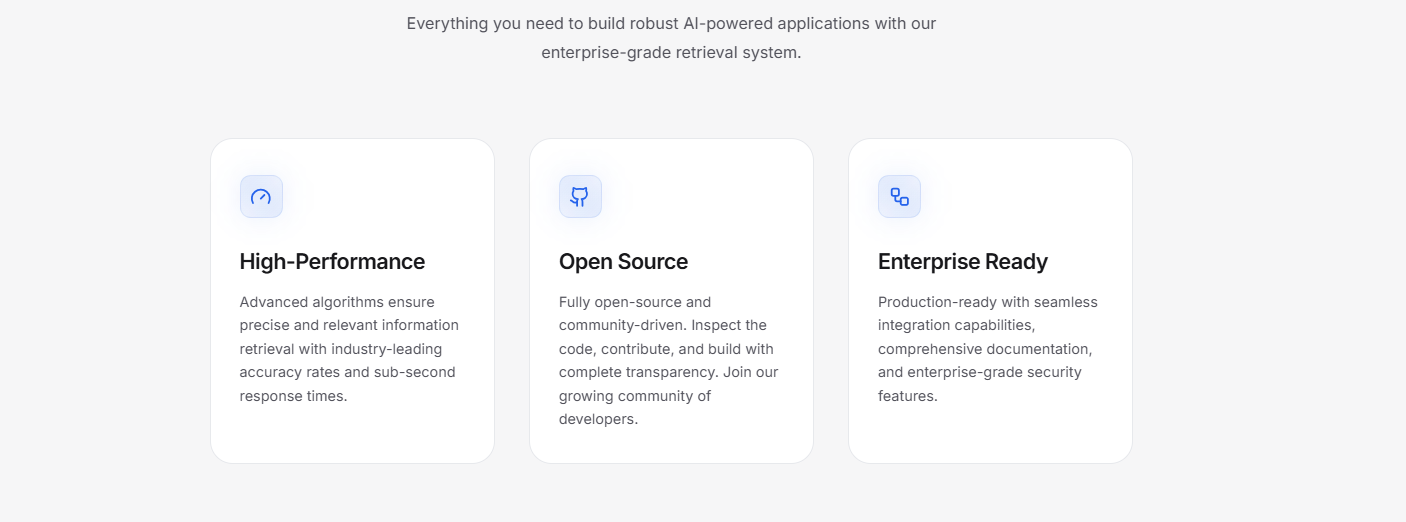
Sign up for a free trial or schedule a demo today and engage users with smarter, faster searches!
FAQs About Elasticsearch Alternatives#
Is there anything better than Elasticsearch?#
It depends on your needs. Alternatives like Denser.ai offer advanced AI features, real-time indexing, and lower complexity, making them better for businesses seeking simpler or more cost-effective solutions.
| Need | Best Alternative | Why |
|---|---|---|
| AI-powered semantic search | Denser.ai | Built-in RAG, context understanding |
| Lower costs | Apache Solr, Typesense | Open-source, simpler infrastructure |
| Easier setup | Algolia, Denser.ai | Managed service, no DevOps needed |
| Microsoft ecosystem | Azure Cognitive Search | Native Azure integration |
What is equivalent to Elasticsearch?#
Tools like Denser.ai, Apache Solr, Algolia, and Azure Cognitive Search are commonly considered equivalents. They offer robust search capabilities with varying levels of scalability and integration.
What replaced Elasticsearch?#
While Elasticsearch hasn't been outright replaced, businesses often turn to alternatives like Denser.ai or Algolia for specific improvements such as AI-driven insights or simpler setups. The shift is driven by:
- Cost concerns: Elasticsearch's resource demands increase with scale
- Complexity: Managing clusters requires specialized expertise
- AI capabilities: Modern alternatives offer semantic search out-of-the-box
Who competes with Elasticsearch?#
Competitors include Denser.ai, Apache Solr, Algolia, Typesense, and Azure Cognitive Search, each offering unique features that cater to different business needs.
Are there Elasticsearch alternatives that specialize in app search?#
Yes, several alternatives are ideal for in-app search, which provides optimized frameworks and tools specifically designed for application environments.
These solutions often offer SDKs and APIs tailored to integrate search into mobile and web applications. It provides the user experience with efficient and accurate search functionalities.
What is the difference between Elasticsearch and vector search databases?#
| Feature | Elasticsearch | Vector Search (e.g., Denser.ai) |
|---|---|---|
| Search type | Keyword/lexical matching | Semantic similarity |
| Query understanding | Exact term matching | Understands intent and context |
| Best for | Log analysis, exact searches | Natural language queries, AI apps |
| ML integration | Requires external setup | Built-in embedding support |
Vector search databases like Denser.ai use embeddings to understand the meaning behind queries, while Elasticsearch primarily relies on keyword matching. For applications requiring chat with PDF or conversational search, vector-based solutions typically perform better. Our benchmark of open-source embedding models shows free alternatives can match paid Anthropic and Cohere models.
Can I migrate from Elasticsearch to an alternative?#
Yes, most alternatives support data migration from Elasticsearch. The process typically involves:
- Export data: Use Elasticsearch's snapshot/restore or bulk export
- Transform format: Convert to the target platform's schema
- Import data: Use the alternative's import tools or APIs
- Validate results: Test search quality and performance
Denser.ai and other platforms often provide migration guides and support to help with the transition.
Which Elasticsearch alternative is best for e-commerce?#
For e-commerce search, consider these options:
- Algolia: Fast instant search, strong e-commerce features, but can be expensive at scale
- Denser.ai: AI-powered product search with semantic understanding, chatbot integration for customer support
- Typesense: Cost-effective, good for small-medium catalogs
The best choice depends on your catalog size, budget, and whether you need AI-powered features like personalized recommendations.